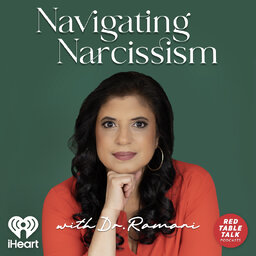What is Codependency? With Priscilla Gilman
Navigating Narcissism with Dr. Ramani
We all have to deal with narcissists. Now, it’s time to heal from them. In this groundbreaking series, clinical psychologist and world’s leading exper…Dr. Ramani breaks down this trendy buzzword while esteemed author Priscilla Gilman reveals her deeply personal journey of shouldering the emotional burden of her parents at a young age, after her father confided that his happiness - and life - depended on her.
Watch and Subscribe to our YouTube Channel @NavigatingNarcissismPod
Follow me on social:
- Instagram - @doctorramani
- Pod Instagram - @navigatingnarcissismpod
- Facebook - @doctorramani
- Twitter - @DoctorRamani
- YouTube: Dr. Ramani’s YT - DoctorRamani
I want to hear from you, too. Have a toxic topic you want me to explore? Email me at askdrramani@redtabletalk.com. I just might answer your questions on air.
Guest Bio:
Priscilla Gilman is the author of two memoirs, The Anti-Romantic Child (Harper, 2011) and The Critic’s Daughter (Norton, 2023), and a former professor of English literature at Yale University and Vassar College. Nick Hornby calls The Critic’s Daughter, “beautiful: honest, raw, careful, soulful, brave and incredibly readable.” Gilman’s writing has appeared in the New York Times, O, the Oprah Magazine, and elsewhere. She is a book critic for the Boston Globe, a certified mindfulness and loving kindness meditation teacher, and a frequent public speaker about parenting, education, autism, and the arts. She lives in New York City.
Guest Information:
- Website: https://www.priscillagilman.com/
- Instagram: https://www.instagram.com/priscilla.gilman/
- Twitter: https://twitter.com/priscillagilman
This podcast should not be used as a substitute for medical or mental health advice. Individuals are advised to seek independent medical advice, counseling, and/or therapy from a healthcare professional with respect to any medical condition, mental health issue, or health inquiry, including matters discussed on this podcast.
EXECUTIVE PRODUCERS Jada Pinkett Smith, Ellen Rakieten, Dr. Ramani Durvasula, Meghan Hoffman VP PRODUCTION OPERATIONS Martha Chaput CREATIVE DIRECTOR Jason Nguyen LINE PRODUCER Lee Pearce PRODUCER Matthew Jones, Aidan Tanner ASSOCIATE PRODUCER Mara De La Rosa ASSOCIATE CREATIVE PRODUCER Keenon Rush HAIR AND MAKEUP ARTIST Samantha Pack AUDIO ENGINEER Calvin Bailiff EXEC ASST Rachel Miller PRODUCTION OPS ASST Jesse Clayton EDITOR Eugene Gordon POST MEDIA MANAGER Luis E. Ackerman POST PROD ASST Moe Alvarez AUDIO EDITORS & MIXERS Matt Wellentin, Geneva Wellentin, VP, HEAD OF PARTNER STRATEGY Jae Trevits Digital MARKETING DIRECTOR Sophia Hunter VP, POST PRODUCTION Jonathan Goldberg SVP, HEAD OF CONTENT Lukas Kaiser HEAD OF CURRENT Christie Dishner VP, PRODUCTION OPERATIONS Jacob Moncrief EXECUTIVE IN CHARGE OF PRODUCTION Dawn Manning
In 1 playlist(s)
Navigating Narcissism with Dr. Ramani
We all have to deal with narcissists. Now, it’s time to heal from them. In this groundbreaking serie…Social links
Follow podcast
Recent clips

Evan Rachel Wood on Surviving Her Abusive Relationship with Marilyn Manson
1:41:41

Ask Dr. Ramani: How To Go "No Contact" with a Narcissist
1:09:53

My Famous Parents are Narcissists with Juliet Landau
1:06:20
 Navigating Narcissism with Dr. Ramani
Navigating Narcissism with Dr. Ramani